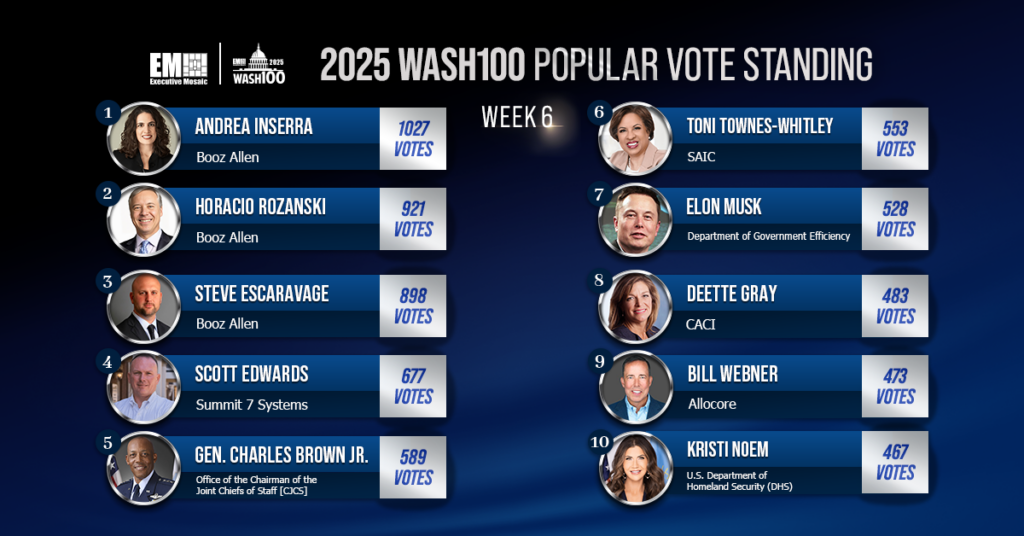Executive Mosaic is pleased to announce the selection of Undersecretary of Defense for Acquisition and Sustainment William LaPlante to the 2024 class of the Wash100 awards, an accolade conferred annually to the 100 most influential and impactful leaders in the government contracting industry.
The Popular Vote Competition of the 2024 Wash100 Award runs through April 30, 2024. Click here to vote for William LaPlante as one of your favorite GovCon industry leaders!
As the Department of Defense's acquisition chief, LaPlante has worked to make sure that the U.S. military possesses the capabilities it needs to protect national security interests and that the U.S. defense industry is in a position to provide them. For these efforts, LaPlante is being honored with the Wash100 award this year, which marks his third straight win and third overall.
Regarding the award, Jim Garrettson, CEO of Executive Mosaic and founder of the Wash100 Award, said, "Bill's common-sense approach to acquisition and sustainment has earned him respect across the government ecosystem and industry. He's a natural leader who bridges divides and gets things done – a true asset in today's complex defense environment. Our Wash100 list would not be complete without Bill, and we’re excited to include him for a third time."
The capabilities that LaPlante must help to provide can come in one of two flavors: anticipated and rapidly emerging. An example of the former are the various weapon systems and munitions that may play a key role in a conflict in the Indo-Pacific region. To ensure the availability of these weapons throughout the duration of a protracted conflict, LaPlante said at a Center for Strategic and International Studies event in September that the Pentagon aims to get them on multi-year contracts.
Using multi-year contracts ensures that the production rate of such weapons, like the Standard Missile-6, the Long-Range Anti-Ship Missile and the Patriot Advanced Capability-3, matches their consumption rate. It also communicates to the defense industrial base the government's commitment to making such purchases.
"I like to think a multi-year would help. Once we put up [economic order quantity funding], which is a bunch of the money up front so they [can buy] a lot of the long-lead items, we generally don’t break multiyear contracts in the DoD; we honor them," LaPlante said.
Another example of anticipated needs are defenses against biological threats. In August, the DOD released its Biodefense Posture Review, which lays out the reforms needed to address the biological threat landscape.
The review's recommendations include conducting exercises to identify biodefense capability gaps and establishing a Biodefense Council, which would facilitate collaboration in addressing biological threats.
Regarding the establishment of the council, LaPlante said, "We're increasing collaboration and synchronizing efforts across the DOD enterprise—everything from policies and authorities, to research, acquisition, and investments—to meet the department's biodefense requirements."
Also in the pipeline are a projected increase in the monthly production of 155mm artillery rounds to 100,000 units per month by fiscal year 2025; the low-rate initial production of the B-21 Raider stealth bomber; interim deals, as reported by Air & Space Forces Magazine, to provide sustainment for the F-35 fighter aircraft in lieu of a performance-based logistics contract that has yet to be negotiated with contractor Lockheed Martin; and the potential continuation of work, in some fashion, on the U.S. Air Force Air-Launched Rapid Response Weapon hypersonic missile, as reported by DefenseScoop.
As important as anticipating future needs may be, equally important is responding to emerging threats, according to LaPlante. At the McAleese Defense Programs Conference this March, the DOD official said, "You can predict all you want; you need to predict, but you also have to be prepared that something, overnight, can just change."
Of particular significance in this respect are counter-unmanned aerial system capabilities, an area where, LaPlante said, things are "rapidly changing overnight."
The DOD acquisition chief told the House Armed Services Committee this February that the agency has 40 programs meant to defeat small drones, and that these programs are awaiting funding.
"We need counter UAS at scale. We need lots of them, whatever they are – kinetic or nonkinetic," LaPlante added. Such capabilities are seen to be critical especially in light of the effectiveness of drones as demonstrated in the conflicts in Ukraine, Gaza and the Red Sea.
Without a healthy industrial base, however, any effort to secure capabilities for the military would not bear fruit.
"A financially healthy and robust industrial base is foundational to our ability to deliver the capabilities our warfighters need at speed and scale," LaPlante said in April last year following the release of the Defense Contract Finance Study, which sought to assess the financial condition of the defense industrial base.
The study offered multiple recommendations, including assisting small businesses on defense contracts with financing, determining the effectiveness of performance-based payments and ensuring the timely payment to subcontractors.
"I look forward to acting upon the study’s recommendations to attract new entrants to the defense marketplace at all levels of the supply chain while maintaining the financial health of our existing partners," LaPlante commented.
In September, the DOD sought to bolster the manufacturing capabilities of defense companies through the Defense Manufacturing Community Support Program, which awarded six grants worth about $30 million in total.
Regarding the grants, LaPlante said, "This year's awards will strengthen advanced manufacturing capabilities in defense-critical sectors while cultivating our most important resource: our people."
The DOD official went on to call for "a paradigm shift to meet the needs of today and the future fight." He made the remark at a conference in October, where he noted how the agency is trying to put an end to the cycle of demand peaks and valleys that has undermined the defense industrial base's ability to sustain production of munitions and other products.
According to LaPlante, to incentivize industry's continuous investment in and therefore readiness for production, contracting strategies are key, such as the use of multi-year contracts. Also helpful are partnerships with U.S. allies, like the security of supply arrangement between the U.S. and Japan.
And by bolstering defense production not just in the U.S. but globally, deterrence against aggression can be achieved.
"The more we work together to expand global capacity of production and sustainment and foster opportunities for even co-development, co-production and co-sustainment, the better off we will be," LaPlante noted.
Through the contributions of the defense undersecretary, the U.S. military is properly equipped, the defense industrial base is strengthened and national security is assured — positive outcomes that testify to the quality of LaPlante's public service leadership, which the Wash100 Award honors and celebrates.
Congratulations to LaPlante and his team for this latest win!
Click here to choose William LaPlante for the Popular Vote Competition!





